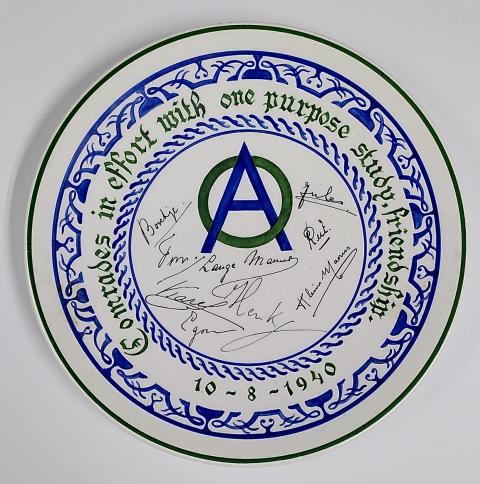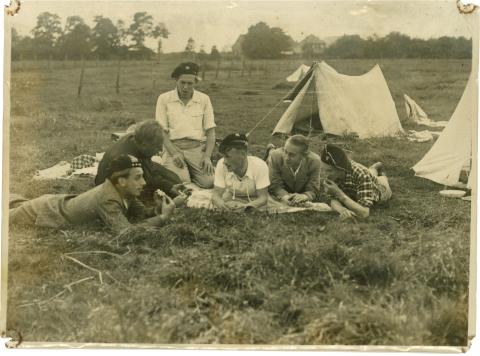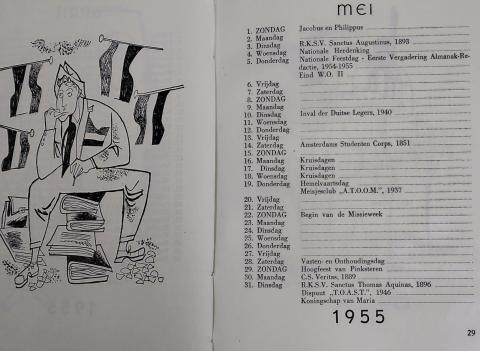Associations
On Saturday, October 8, 1927, not only was the Katholieke Handels Hoogeschool formally founded, but it was also the founding date of student association Olof. The name was an invention of Rector Magnificus Goossens and taken from the later canonized King Olaf II of Norway, a rather heavy-handed zealot for the Christianization of the Norwegians. The association's motto was coined by Professor Weve: Per Justitiam ad Pacem (toward peace through justice).
In the beginning, every student more or less automatically became a member of St. Olof. This gave the society leeway to establish several debating societies, one of which is the still existing A One (1933). The objects in the display cabinet come from alumnus Joseph August de Meijer (1915-2000) who was, among other things, state secretary in the Marijnen government (1963-1965) and member of parliament for the KVP.
Other well-known former members of St. Olof include singer Guus Meeuwis, former politician Norbert Schmelzer, and former Rabobank chair and World Bank trustee Herman Wijffels.

St. Olof’s debating society A One (pictured above)
Associations in Tilburg changed after the war in several ways. The number of students who became members of a traditional student association decreased, while new associations, often less classical in nature, emerged. For example, the Tilburg Student Rowing Association Vidar was founded in 1961. Since 1976, Vidar has had a rowing complex on the Wilhelmina canal, near the Beekse Bergen. The name—like that of TSC St. Olof—is of Norwegian origin. 'Vidar' (or 'Widar') was a silent, somewhat reclusive forest god in Nordic mythology. According to the Edda—a collection of mythological tales from the 9th and 12th centuries—he lived in Landvidi (wide country) hidden behind trees and bushes, where everything was peaceful. Landvidi is also the name of the foundation that formally owns the accommodation.
In 1987, TSV Plato was founded, now the largest student association in Tilburg. There was a need for a "more accessible" association, without corporal mores and hazing. So, although not on traditional lines, the name of the newcomer could hardly be more classic: Plato, the 5th century B.C. Greek thinker and founder of the Athenian Akademeia, the first institution of higher learning in the West. But, in this case, Plato stands for "Plezierige en Leuke Activiteiten in Tilburg en Omstreken” (Pleasant and Fun Activities in Tilburg and Surroundings). In 2007, the association—with support from the university and then-mayor Ruud Vreeman, among others—moved into its current home on the Schouwburgring. With a well-insulated building and an organized door and bicycle policy, Plato managed to win over the neighborhood and the Sint Anna neighborhood council. The name of the new Society, how could it be otherwise, became Akademeia.
The latest addition to the association tribe is I*ESN, founded in 2011 after a merger process of associations resulting from the internationalization of the university. The goal of I*ESN is to make students feel at home in Tilburg, and one of the places where this happens is the association's Carpe Noctem ("seize the night") building at Heuvelstraat 45 where I*ESN has been based since 2016. Among the multitude of activities, programs focusing on Dutch literature stand out as does the annual international cantus. Participants appear in attire characteristic of their country. That means the Germans appear in Lederhosen and the French with an Alpine cap on. Dutch students, however, do not appear in clogs but are dressed in orange. The latter may be called a modern tradition.


The Brabant Student Guild at camp (top left image) and important dates in the 1954 St. Olof almanac (top right image)
More about history and academic heritage
The Tilburg University academic heritage is a very diverse set of archives, visual materials, collections, devices, recorded stories, et cetera that relate to the history of the university.